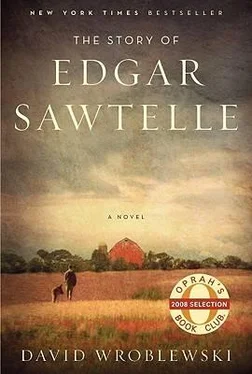The next morning, they drove back into town for breakfast. The diner was situated across the street from the Mellen town hall, a large squarish building with an unlikely looking cupola facing the road. In front stood a white, three-tiered drinking fountain with one bowl at person height, another lower, for horses, and a small dish near the ground whose purpose was not immediately clear. They were about to walk into the diner when a dog rounded the corner and trotted nonchalantly past. It was Captain. He was moving in a strangely light-footed way for such a solidly constructed dog, lifting and dropping his paws as if suspended by invisible strings and merely paddling along for steering. Edgar’s grandfather stopped in the diner’s doorway and watched. When Captain reached the front of the town hall, he veered to the fountain and lapped from the bowl nearest the ground.
“Come on,” his buddy said. “I’m starving.”
From along the alley beside the town hall came another dog, trailing a half-dozen pups behind. She and Captain performed an elaborate sashay, sniffing backsides and pressing noses into ruffs, while the pups bumbled about their feet. Captain bent to the little ones and shoved his nose under their bellies and one by one rolled them. Then he dashed down the street and turned and barked. The pups scrambled after him. In a few minutes, he’d coaxed them back to the fountain, spinning around in circles with the youngsters in hot pursuit while the mother dog stretched out on the lawn and watched, panting.
A woman in an apron walked out the door of the diner, squeezed past the two men, and looked on.
“That’s Captain and his lady,” she said. “They’ve been meeting there with the kids every morning for the last week. Ever since Violet’s babies got old enough to get around.”
“Whose babies?” Edgar’s grandfather said.
“Why, Violet’s.” The woman looked at him as if he were an idiot. “The mama dog. That dog right there.”
“I’ve got a dog named Violet,” he said. “And she has a litter about that age right this moment back home.”
“Well, what do you know,” the woman said, without the slightest note of interest.
“I mean, don’t you think that’s sort of a coincidence? That I’d run into a dog with my own dog’s name, and with a litter the same age?”
“I couldn’t say. Could be that sort of thing happens all the time.”
“Here’s a coincidence happens every morning,” his buddy interjected. “I wake up, I get hungry, I eat breakfast. Amazing.”
“You go ahead,” John Sawtelle said. “I’m not all that hungry anyway.” And with that, he stepped into the dusty street and crossed to the town hall.
WHEN HE FINALLY SAT DOWN for breakfast, the waitress appeared at their table with coffee. “If you’re so interested in those pups, Billy might sell you one,” she said. “He can’t hardly give ’em away, there’s so many dogs around here.”
“Who’s Billy?”
She turned and gestured in the direction of the sit-down counter. There, on one of the stools, sat Captain’s owner, drinking a cup of coffee and reading the Sentinel. Edgar’s grandfather invited the man to join them. When they were seated, he asked Billy if the pups were indeed his.
“Some of them,” Billy said. “Cappy got old Violet in a fix. I’ve got to find a place for half the litter. But what I really think I’ll do is keep ’em. Cap dotes on ’em, and ever since my Scout ran off last summer I’ve only had the one dog. He gets lonely.”
Edgar’s grandfather explained about his own litter, and about Vi, expanding on her qualities, and then he offered to trade a pup for a pup. He told Billy he could have the pick of Vi’s litter, and furthermore could pick which of Captain’s litter he’d trade for, though a male was preferable if it was all the same. Then he thought for a moment and revised his request: he’d take the smartest pup Billy was willing to part with, and he didn’t care if it was male or female.
“Isn’t the idea to reduce the total number of dogs at your place?” his buddy said.
“I said I’d find the pups a home. That’s not exactly the same thing.”
“I don’t think Mary is going to see it that way. Just a guess there.”
Billy sipped his coffee and suggested that, while interested, he had reservations about traveling practically the length of Wisconsin just to pick out a pup. Their table was near the big front window and, from there, John Sawtelle could see Captain and his offspring rolling around on the grass. He watched them awhile, then turned to Billy and promised he’d pick out the best of Vi’s litter and drive it up-male or female, Billy’s choice. And if Billy didn’t like it, then no trade, and that was a fair deal.
Which was how John Sawtelle found himself driving to Mellen that September with a pup in a box and a fishing rod in the back seat, whistling “Shine On, Harvest Moon.” He’d already decided to name the new pup Gus if the name fit.
Billy and Captain took to Vi’s pup at once. The two men walked into Billy’s backyard to discuss the merits of each of the pups in Captain’s litter and after a while one came bumbling over and that decided things. John Sawtelle put the spare collar on the pup and they spent the afternoon parked by a lake, shore fishing. Gus ate bits of sunfish roasted on a stick and they slept there in front of a fire, tethered collar to belt by a length of string.
The next day, before heading home, Edgar’s grandfather thought he’d drive around a bit. The area was an interesting mix: the logged-off parts were ugly as sin, but the pretty parts were especially pretty. Like the falls. And some of the farm country to the west. Most especially, the hilly woods north of town. Besides, there were few things he liked better than steering the Kissel along those old back roads.
Late in the morning he found himself navigating along a heavily washboarded dirt road. The limbs of the trees meshed overhead. Left and right, thick underbrush obscured everything farther than twenty yards into the woods. When the road finally topped out at a clearing, he was presented with a view of the Penokee range rolling out to the west, and an unbroken emerald forest stretching to the north-all the way, it seemed, to the granite rim of Lake Superior. At the bottom of the hill stood a little white farmhouse and a gigantic red barn. A milk house was huddled up near the front of the barn. An untopped stone silo stood behind. By the road, a crudely lettered sign read, “For Sale.”
He pulled into the rutted drive. He parked and got out and peered through the living room windows. No one was home. The house looked barely finished inside. He stomped through the fields with Gus in his arms and when he got back he plunked himself down on the running board of the Kissel and watched the autumn clouds soar above.
John Sawtelle was a tremendous reader and letter writer. He especially loved newspapers from faraway cities. He’d recently happened across an article describing a man named Gregor Mendel-a Czechoslovakian monk, of all things-who had done some very interesting experiments with peas. Had demonstrated, for starters, that he could predict how the offspring of his plants would look-the colors of their flowers and so on. Mendelism, this was being called: the scientific study of heredity. The article had dwelt upon the stupendous implications for the breeding of livestock. Edgar’s grandfather had been so fascinated that he’d gone to the library and located a book on Mendel and read it cover to cover. What he’d learned occupied his mind in odd moments. He thought back on the vision (if he could call it that) that had descended upon him as he shook Captain’s paw at The Hollow. It was one of those rare days when everything in a person’s life feels connected. He was twenty-five years old, but over the course of the last year his hair had turned steely gray. The same thing had happened to his grandfather, yet his father was edging up on seventy with a jet black mane. Nothing of the kind had happened to either of his elder brothers, though one was bald as an egg. Nowadays when John Sawtelle looked into the mirror he felt a little like a Mendelian pea himself.
Читать дальше
Конец ознакомительного отрывка
Купить книгу












